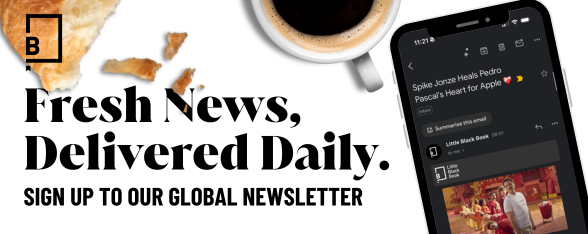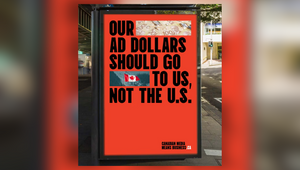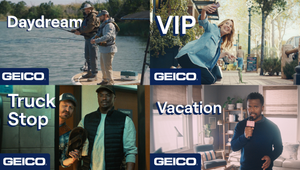
Brand Insight: How THIS Serves Plant-Based Meat Alternatives without the Side of Sanctimony

Anyone who’s ever given up meat will be familiar with the meat-eater’s compelling argument: “But bacon!” Touché, I would have said until fairly recently. But British plant-based meat brand THIS makes a bacon alternative that takes the sting out of that point.
When the term Veganuary was coined back in 2014, suddenly switching from an omnivorous diet to a completely plant-based one was a serious challenge, often requiring a complete overhaul of how you feed yourself.
Now, thanks to brands like THIS creating convincing alternatives, a simple swap out is available to recreate most meat-based meals.
But rather than simply tell us that, for Veganuary, THIS has chosen a more cheeky tactic, launching a live call centre to help meat reducers, vegetarians and vegans deal with the temptation of eating meat during the month of January.
Teaming up with up-and-coming comedians to monitor the helpline, live (everyday from 10am - 10pm, until the end of January), they will be answering people’s calls with meat-based jokes, plant-based puns and animal noises, to help get them through the month of no meat with a smile on their face.
Throughout the month, posters will appear with the helpline on telephone boxes outside London fast food outlets including McDonald’s, KFC, Burger King, Chicken Cottage and Taco Bell, as well as being shown on roving vans around the city.
The campaign is typical of the THIS school of marking - a cheeky antidote to other brands in the category that can often feel like an ethics lecture. To find out where this approach came from, LBB’s Alex Reeves caught up with THIS co-founder Andy Shovel.

LBB> Thanks for taking the time to speak to me during Veganuary. For a brand like yours, it must be a busy month!
Andy> Thanks for the interest. It is definitely busy for us but I'm not on the operations side. So it's a bit less than bonkers for me. But my other co-founder Pete is ageing rapidly this month!
LBB> Obviously you took a long time to develop such convincing meat alternative products, but what were your thoughts around building the brand at the start?
Andy> The first thought was probably twofold. As meat eaters at the time, a couple of years ago, we didn’t feel like any of the brands' look and feel in the space were for us. We didn't like them, we didn’t want to buy them, we didn’t feel that they were relatable to us. That was thought number one.
Thought number two leading on from that was, it must look nothing like and sound nothing like any of these brands. We needed to find ways to try and differentiate ourselves in terms of tone, look and feel. So those were the first two thoughts, when we first kind of decided to enter the space.
We decided quite early on that people thought the food was weird. When I say people I mean the mass market - they still have a lingering suspicion about plant-based meat alternatives. So we felt that to try and disarm people's suspicions and cautiousness, we would use this tactic of trying to be relatable and funny and use pranks and stunts to get people to fall in love with it and be intrigued by the brand. That's kind of how the tone was born.
LBB> How did that turn into the visual identity? Your packaging is really different looking to other brands in the category.
Andy> Everybody said ‘you can't do black and white’, because that's not appetising, nobody does it in food. And we obviously went with monochrome in the end. We also don't have product photography on the packs. Most products will have great big hero shots, or a big meal shot of a spag bol or whatever it is. We opted out of that. We only have a little cue, which is in our logo, of the product itself on the packaging.
We took the decision to go with Johnson Banks, which is a branding agency. They had never done anything in food or drink before. And we deliberately ended up avoiding agencies that showed us lots of work around food and drink because we thought if we really truly want to be different, we’d better use an agency that has no prior ideas or ways of thinking in the food and drink business.
LBB> How did that tone end up coming out in the marketing you did?
Andy> The first expression of the tone was probably the first stunts that we did. We assembled a bunch of food critics and food bloggers, got them into a restaurant and we had a Michelin star chef cook them a meat-based meal. But all the meat was actually THIS. We put secret cameras up, we put hidden microphones in the plant pots on the tables. And it was brilliant.
It got picked up by the press. And I think it was the first time that we showed what we're all about which is kind of jarring people into understanding that there is now a product out there which is good enough to trick you. Which has kind of been our thing since. We've made a bunch of different videos and stunts around that theme.
LBB> Taking the tactic of trying to fool people isn’t the safest marketing tactic. How do you balance that with the power that it sends as a message?
Andy> I speak to our lawyers probably once a week, because everything we do is trying to push the envelope and there is always a bit of calculated risk in our marketing. Some people don't like being tricked when it comes to food. We mess around with other brands in the space, sometimes we use other people's logos. We don't make a habit of taking legal risks, obviously, because we have a duty not to. But having said that, we are probably a bit less cautious than a lot of the food and drink brands that I've come across.
LBB> It strikes me that you’re not marketing directly to vegetarians and vegans but more to people who like eating meat and haven’t found a substitute that’s as good as the real thing.
Andy> Yeah, that's the nail on the head. I mean, we don't want to shun the early adopters and people that are already on board, by any means. But we do put our focus on the people who are yet to trial our products.
LBB> What’s the key to marketing to that audience, in your experience?
Andy> I think part of it is there's a total lack of sanctimony. I think sometimes ethical, sustainable brands - which we are - will often virtue signal. They will make it very loud and clear that they are the ethical choice and essentially suggest any other choice is actually not ethical. So, they're intrinsically quite sanctimonious, even if they're not explicitly. We don't take any of that stuff on board with our marketing. We don't lecture. We speak like meat eaters, I would say, in the sense that we're not very sensitive, we swear, and we don't mind properly pranking people. We're not afraid to ruffle feathers, which is not really the mainstay of ethical, sustainable brands.
The industry, I think, has had a collective understanding that in the past that, if you are having a meat-free product, then you need it to be holier than thou, you need to be super healthy. And you need the branding to also reflect your ethical choice. And I think all of those assumptions are actually incorrect. Because people that are reducing meat or have given up meat entirely still want the same things - the same highs and lows and the same compromises. They want the occasional healthy things and they want occasional not healthy things. And so I just think it has been a bit topsy turvy for me and we want to reflect the meat industry more in the way that we speak to people and the way we offer up a variety of products.
LBB> The meat and dairy industry’s push back against the rise in alternatives has often focused on the sort of pastoral idyll picture of the wholesome farms that these products come from. But a strong argument could be made for showing how much more efficient and sustainable farming to create meat alternatives can be. Would you like to see that message pushed more by the meat alternatives category?
Andy> To be honest, I think it's a great, credible message for the category and for activists to promote. But for our brand, it’s not really in keeping with the levers we wish to pull to get more love for our brand and sell more products more around trying to normalise by using humour and trying to basically stun and shock people into trial. Those are the methods that we are more interested in. But it’s completely coherent and fair to say that it's a much more wholesome process. I mean, nothing is suffering and the environmental impacts are obviously far diminished.
LBB> Can you tell us a bit about how all this thinking fed into your Veganuary campaign, where you’ve set up a live helpline to help meat reducers, vegetarians and vegans deal with the temptation of eating meat during the month of January?
Andy> I'd love to name drop Hell Yeah, a fantastic agency, who came up with the idea and worked hard on the creative side. The rationale is basically that we want to be a brand that makes people smile, but in a kind of naughty way, rather than in a wholesome, huggy kind of way. The idea when we heard it from Hell Yeah was just perfect. If we were militant activists we might set up a helpline that would genuinely kind of advise people of how to get through Veganuary, but there's something quite subversive and contrary about the idea of setting up a vegan helpline that messes around. We've staffed it with up-and-coming comedians, and they basically just have a laugh and they take the mickey. It's this refreshingly un-preachy thing to do in Veganuary that gets people engaged and enjoying the brand. But also, I genuinely think it probably helps them keep to their Veganuary goals, because if they suddenly have all this goodwill towards a plant-based brand, maybe it subliminally helps them carry on.
It's been really fun. I think we're on about 6,000 calls now. So it's been really well received. We've had a bit of fun with the outdoor campaign. We took a load of phone boxes and billboards in London, and we strategically put them next to chicken shops and burger places, so some of the photos are really funny. A bit of light trolling never hurt anyone.















